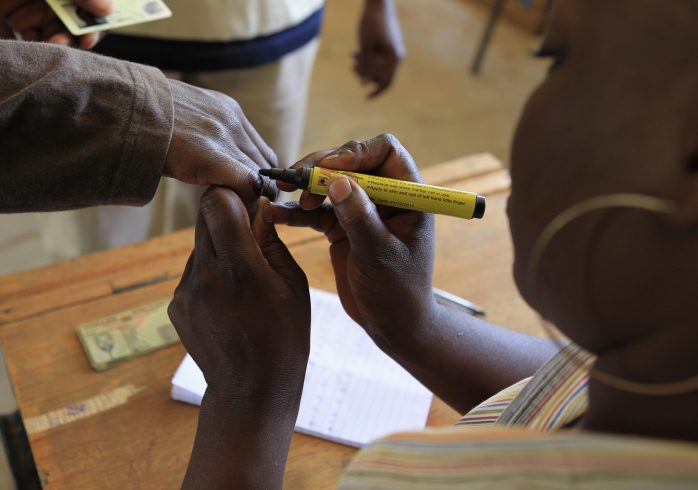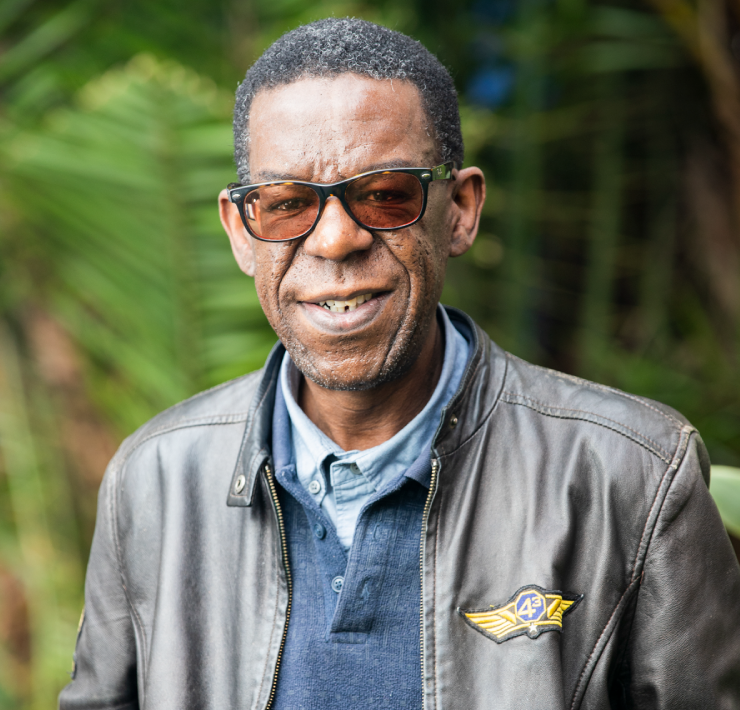Shortly after the new year kicked in, I set out to pick my kitenge shirt from Anne Anyango’s shop in Mradi, Mathare. Anne, commonly known as Mama Chris, is my good friend and a skilled tailor who runs a makeshift workshop with excellent tailoring and embroidery offerings. I was picking the shirt, which she was very generously making for me at no cost, later than I should have. I had intended to rock it for Christmas day, but with outstanding tailors like Anne, one must always practice patience. Her shop is constantly abuzz with clients eager to try out their new flamboyant attires, and the day I pulled up at Anne’s was no exception. I had to wait for about three hours before we could comfortably chat.
My conversation with Anne spanned from the holidays to the eventful new year, which is already perky with heated political campaigns as we edge closer to the August 9, 2022 general elections. A mother of three, Anne is largely disgruntled by the thought of another electioneering season. “Life in Kenya has become intolerable and it can only get worse,” she said, binding a blue garment. “Last year Corona almost paralyzed my business and now this year, as though we don’t deserve to breathe, will be all about politics. It makes my stomach churn.” Anne’s tone forced me to quickly ask why she felt so strongly against the electioneering period, given we’d never once discussed politics in all our correspondence. “I promised myself to never vote again,” she retorted. Her delivery was deadpan. A sobering moment for me.
Like Anne, a section of the Kenyan populace remains disinterested in partaking in the impending general election. This has manifested through a largely unimpressive voter registration drive across the country, where while the Independent Electoral and Boundaries Commission (IEBC) targeted six million new voters within the month of its October 4th to November 5, 2021 registration exercise, only 1,519,294 eligible Kenyans registered during the drive. The IEBC has since had to roll out a second and final phase of the Enhanced Continuous Voter Registration (ECVR) from January 17th to February 6, 2022 with the aim of offering another opportunity to the 4.5 million eligible Kenyans who missed the first phase in terms of registering, transferring polling stations or changing their particulars. The youth, who comprise 77% of Kenya’s population and are the bigger portion of the electorate currently, exude the most apparent lack of faith in the electoral system, according to the Kenya Youth Survey report by the Aga Khan University.
Does the Vote Really Count?
There’s certainly a plethora of reasons why this particular section of Kenyans is indifferent to electoral politics, one of them (if not key among them) being the unassailable view that the outcome of a Kenyan election (especially at the presidential level, which has resulted in post-election violence before) isn’t decided by the number of votes a candidate gurners but through suspected extra-legal means, so that a winner is decided before the vote happens.
Marrying this lack of faith in electoral integrity to youth unemployment and the concomitant hopelessness – with the political race almost always being reduced to contests between the same old characters – seemingly makes voting in the eyes of this constituency an exercise in futility. The fatalistic view is that whoever wins, nothing changes in terms of the unemployed youth’s material circumstances, and so to hell with elections! This, however, shouldn’t be the state of affairs, and must be reversed.
The Manifesto Fiasco
Tied to this general disillusionment is the fact that more often than not political party manifestos aren’t worth the pieces of paper they’re written on – either because no one believes the politicians wielding them have the capacity and will power to implement them, or because the politician’s track records are the direct opposite of what they promise – and an even more bizarre twist is that almost all manifestos presented to the electorate read nearly the same.
The Zero Sum Game
Then there’s the recurrent deficient voter education, with the significance of an enlightened voter getting lost in the hardcore push by politicians for more voter registration from their respective political bases – for particularly no noble reason other than their need to up the numbers for numbers’ sake.
“To be my true soldier, you must arm yourself with a gun and a bullet. The gun is your national ID card, and the bullet is a voter’s card,” Raila Odinga urged his supporters in Nakuru recently. He continued, “Those who haven’t registered must come out and wield their guns and bullets so that when Baba, as your general commander, says ‘forward match! About-turn! Fire! Fire! Youth fire!’, you will be equipped.”
On their part, Odinga’s competitors, the United Democratic Alliance (UDA) group also lobbied their supporters, maintaining that the youth can only elect the right leaders if they register as voters. Deputy President William Ruto persuaded his adherents in a recent rally, “I want to ask every Kenyan, wherever they are, that if there is one single patriotic duty each one of us must accomplish, it’s to form the next government using your vote. Do not complain. Do not argue. Please take your vote and vote for the right people. Take your vote and vote for the right policies. Take your vote and vote for the right government. It is you to decide, and you cannot decide if you do not have a voter’s card.”
However, the absurdity is that the Kenyan political class never seems to appreciate the fact that potential voters do not just want to be coerced into registering to vote, but desire to be told and shown more about the entire electoral process – why their votes matter and why they should register to vote, how to choose who to vote for, how to vote, how that vote shall be protected and secured, and why and how the outcome matters.
A Call for Deeper Introspection

But numerous questions still linger about my mind, like the static pain dangling in an addict’s brain. Are the aforementioned reasons all there is to people’s disregard for the elections? Or are we simply missing the forest for the trees? A good starting point for me were Anne’s subsequent remarks.
“After being voted in, leaders vanish only to reappear during the new election cycle. Our neighborhood is predominantly a Luo territory and most of us voted for Raila last time, every time, just as those from other parts of Mathare voted for Uhuru,’’ she said. ‘‘But we have never seen him set foot here, nor have we received a message of solidarity from him for what happened to us and our families during the 2017 general election.”
In an attempt to share context using her personal experience, Anne narrated an unsettling ordeal. The Mradi village underwent a prolonged lockdown in the wake of the last polls. During election periods, areas like Mradi, flagged as ‘hotspots’, witness an overflow of armed General Service Unit (GSU) officers who surround all entry points in huge trucks – an occurrence locally termed as ringis, mostly understood as the government’s informal method of containing potential violence.
That morning after the 2017 ballot was cast – and in the pretext of containing supposedly simmering violence – Anne confides that security officers closed in on the citizenry, resulting in serious injuries and destruction of their makeshift homes. Anne recalls being isolated in the house with her two sons, Mike aged 10 and Chris aged 18 (who had their 17 year old friend, Silas, from next door over.) Everything was super tense and the atmosphere reeked of horror. Before long, the boots started forcing their way into people’s houses.
“I could see them storm in from door to door through the holes on my iron-sheet walls,’’ Anne said.’’ I saw them, which was much harder to watch, kick down the frame of my door and all its hinges. There they were!”
Chris hid behind the curtains while Silas quickly rushed under the bed. Her youngest child, Mike, had the couch to shelter with and now the only thing that stood between her boys and extreme violence was the terrified frame of a desperate mother. “I failed my kids when the cops pulled Chris from behind the curtain and rained on him with clubs and whips,” she continued, still pulling my kitenge shirt back-and-forth through the sewing machine. I was immensely appalled to hear that all of Anne’s attempts at intervention were dead on arrival. Every single plea, she said, was firmly countered with cold name-calling. The officers had literally stripped her of the power to stand up for her own son. When Mike attempted to defend his elder brother, one policeman slapped him with so much malice as to permanently impair his eyesight.
“I screamed for help despite being well aware that no one would come to our rescue. Everyone had their own cross to bear. But I didn’t know what else to do,” she narrated. They then forced little Mike to tell on anyone else who was hiding inside the house, which he did, trusting that it would help rescue his brother from all the battering. Mike gullibly asked Silas to come out of hiding, giving away his sanctuary. “Now, the seven policemen amused themselves with assaulting two defenseless boys in my presence,” she proceeded, “I screamed even louder when I saw my Chris begin to writhe and foam at the mouth.”
That day, Anne clarified as she handed me my blue shirt to try on, the police seemed to be on a mission to lynch any adult or young male they came across, inside or out in the streets. “I mean, what was I to do? How was a helpless woman going to challenge that kind of viciousness? You look fabulous by the way!”
“Thank you, Mama Chris! This is so kind of you.”
Many young men suffered fatal injuries that day and several died. Anne’s household was not the only one affected. The Red Cross team was palpably overwhelmed by the number of people who needed urgent medical attention. Chris and Silas were in profound shock. You could almost hear the horror in their blank stares – it was mighty loud but only the attentive ones would catch it. Her voice shook as she said, “I had never seen anything kill my son Chris’ spirit the way the news of his friend Silas’ death a few days later did. It utterly shattered his soul.”
It took Chris a series of therapy sessions to deal with the trauma. He was still in deep shock and had not been eating for a while when Anne’s good neighbor, who practices physiotherapy at a community clinic, offered to walk with him through his recovery journey. As I left Anne’s shop with my new shirt, one thing sat with me: voter education or not, if we do not sanitize electoral practices and their aftermaths wholistically, history is likely to repeat itself come election season, and that will further widen the dent in our democracy and plummet the country into unfathomable anarchy.
“They may never acknowledge our pain, but each time Mike’s eyes ache him, I hurt. Whenever Chris finds it difficult to bend or do any heavy lifting, he remembers. As do I.” Anne said. “We shall heal and move on, alright. But we shall never forget!”
This is the voter Kenya needs to go after.



